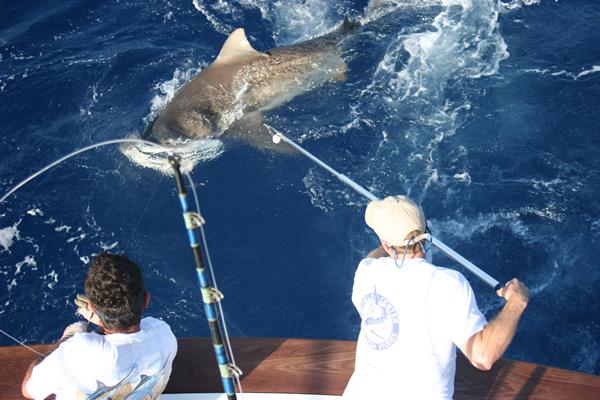Local Shark Tourney Focuses on Shark Preservation

“Y’all know me. Know how I earn a livin’. I’ll catch this bird for you, but it ain’t gonna be easy. Bad fish. Not like going down the pond chasin’ bluegills and tommycods. This shark, swallow you whole. Little shakin’, little tenderizin’, an’ down you go. And we gotta do it quick, that’ll bring back your tourists, put all your businesses on a payin’ basis. But it’s not gonna be pleasant. I value my neck a lot more than three thousand bucks, chief. I’ll find him for three, but I’ll catch him, and kill him, for ten.”—Captain Quint, Jaws
Shark fishing is a longtime tradition in Montauk, part of life and part of the legend that has grown around the fearsome denizens of the deep, popularized by captain Frank Mundus and the character that legend says he inspired in Jaws. For decades, shark tournaments have been a defining symbol of summer on The End. Just last week, the Montauk Marine Basin held their 43rd Annual Shark Tag Tournament, with the winning vessel—Joy Sea, captained by local charter boat fisherman Chuck Mallinson—landing a 377-pound mako.
But this year a new twist on the Montauk shark tournament culture will occur with the arrival of Shark’s Eye from July 26 to 28. A no-kill tournament focusing on shark preservation and held in the collective spirit of sport, science, conservation and education, Shark’s Eye is Montauk’s first satellite tag and all-release fishing tournament, and will also be hosted by Montauk Marine Basin.
The world needs to pay attention to how many sharks are in our waters. Sharks are a vital part of the ocean’s ecosystem, and a number of factors are causing a startling decline in many species. The main culprit is NOT shark tournaments, however. Large-scale threats to these animals come from such sources as overfishing; millions of sharks being caught in shark-meshing nets protecting beach areas inhabited by humans; sharks getting caught on longlines meant for other fish (typically tuna and swordfish); and such practices as “finning.” Shark fin soup is a high-demand delicacy in Asia, and there’s a good deal of money to be made by supplying shark fins to restaurants. The method for obtaining this core ingredient is devastating, as the fishermen catch sharks for the sole purpose of cutting off their fins, then throw the sharks back into the ocean, where they are unable to swim and eventually die.
A large-scale education and conservation effort is underway to combat these and other dangers, with events such as Shark’s Eye among the more. Great entertainers will on-hand to show support, with country music legend Colton James and folk music star Caroline Doctorow scheduled to entertain at Gosman’s.
“We are also going to have a multitude of education tables under a tent for people to learn about sharks, and there will be a multitude of artists that are going to be here,” says Carl Darenberg, owner of Montauk Marine Basin. “April Gornik is going to be donating a painting for the winner that I’m sure is going to be worth some money.”
Some of the foremost research scientists in the country—including those from the Riverhead Foundation and OCEARCH, which is renowned for its method of tagging sharks with satellite technology that allows the creatures’ migrations to be followed by the public via an online app—will also be heading out to Montauk to collect data on the sharks that are caught.
“The people at OCEARCH are going to be there and they will be the ones who will tag our sharks with GPS tags,” Darenberg says, before revealing a familial tie to this technology.
“As far as GPS tagging goes, my father back in 1979 actually tagged a great white shark off of Montauk that was circling around a dead whale. He tagged it with a device that had three dry-cell batteries on it that only lasted for four days. You can’t believe how far this shark traveled in just four days, so it will be pretty interesting to see how far the sharks will travel that we tag at the upcoming tournament, because those tags last years.”
OCEARCH personnel will determine on-site which sharks will get their special tags, but the goal of getting the public involved won’t be forgotten.
“The person who is lucky enough to catch a shark that ends up being one of the four that are tagged with the OCEARCH technology will get to name the shark,” Darenberg reveals, “and one of the sharks will also be named by the Montauk Elementary School.”
As for the fishermen in competition—there’s $10,000 in prize money on the line—the way this tournament will be scored is fairly straightforward, Darenberg explains.
“It’s basically going to be a catch-and-release tournament with observers onboard each boat. Each observer is going to be responsible for taking a picture of each shark caught. Having the observer is going to be the primary way we validate the catch.”
To be considered for release points, the picture of the shark must show the shark in the water with someone holding the fishing rod attached to the shark. The species of the shark must be identifiable by the photo, and after the shark has been released, a dry-erase catch board must be filled out and photographed. For release points to be considered, teams must turn in their tournament camera and the catch board to the tournament committee by 6 p.m. each day they fish.
The tournament will use only circle hooks, which are designed to hook in the corner of the mouth of a fish and won’t be swallowed. Release points are based on the species of the shark. Blue sharks and brown sharks are worth 1 point. Makos, hammerheads, tigers and dusky sharks are worth 4 points, thresher sharks are worth 6 points and great white’s are worth 10 points. Any shark that is among the four chosen to be tagged by OCEARCH will be worth 5 extra points.
Darenberg decided to host the no-kill tournament this year because he believes that’s where shark tournaments are headed.
“This type of tournament is the wave of the future. I think that with the way things are going with sharks, we’re going to be having these types of tournaments more often. This year, a regulation almost happened that would have put an eight-foot limit on regular shark tournaments. That would have essentially killed regular tournaments, because catching something that size simply doesn’t happen that often.”
Shark’s Eye—A Revolutionary Charity Fishing Tournament to Save Sharks July 26–28 at Montauk Marine Basin, marinebasin.com. Benefiting local nonprofits.



